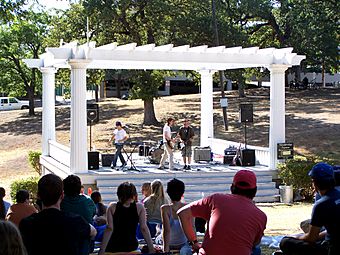Wooldridge Park facts for kids
Quick facts for kids |
|
|
Wooldridge Park
|
|

The gazebo in Wooldridge Park is a popular spot for outdoor concerts and weddings among other engagements.
|
|
| Location | Austin, Texas United States |
|---|---|
| Area | 1.8 acres (0.73 ha) |
| Built | June 18, 1909 |
| Architect | Page & Page |
| Architectural style | Classical Revival |
| NRHP reference No. | 79003018 |
| Added to NRHP | 1 August 1979 |
Wooldridge Park, also known as Wooldridge Square, is a special green space in downtown Austin, Texas. It's like a city block that dips down in the middle, forming a natural outdoor theater. At the center of this dip, there's a lovely bandstand or gazebo. This park was added to the National Register of Historic Places in 1979 because of its importance.
Contents
History of Wooldridge Park
Wooldridge Park is one of four original public squares planned for downtown Austin way back in 1839. This plan was created by Edwin Waller for the city. However, for about seventy years, the park area remained empty.
How the Park Was Created
In 1909, the people of Austin felt a lot of pride in their city. The Mayor at the time, Alexander Penn Wooldridge, decided to make the square beautiful. He helped pay for the area to be cleaned up. He also supported building a classical revival-style gazebo. A gazebo is a small, open building, often found in parks, used for concerts or events. The park officially opened that same year. It was dedicated on June 18, 1909, with a big celebration and a speech from the Mayor.
Wooldridge Park Today
Wooldridge Park is special because it's the only one of the original four public squares that is still used as a park. The other three squares were changed over time. They became things like parking lots, a fire station, a church, a museum, and even places for businesses.
Protecting the View
From Wooldridge Park, you can see a great view of the Texas State Capitol building. This view is so important that it's part of the Texas Capitol View Corridors. These are special areas protected by state and local laws since 1983. This means that tall buildings cannot be built in these areas to block the view of the Capitol.

